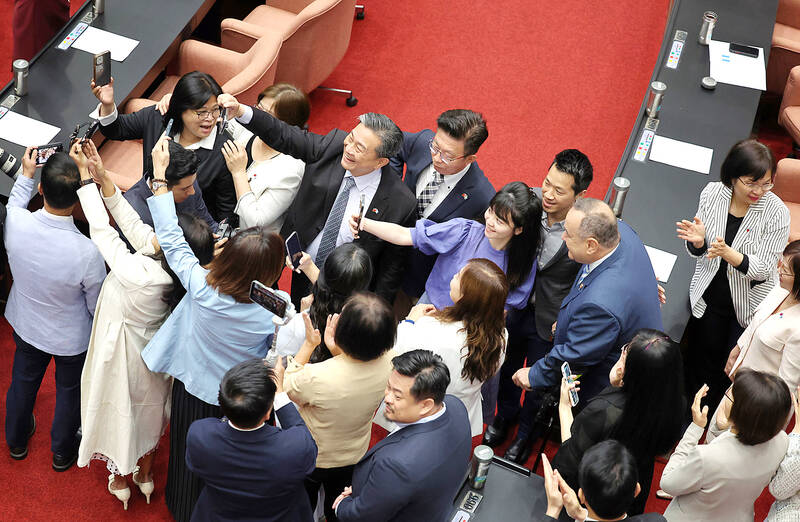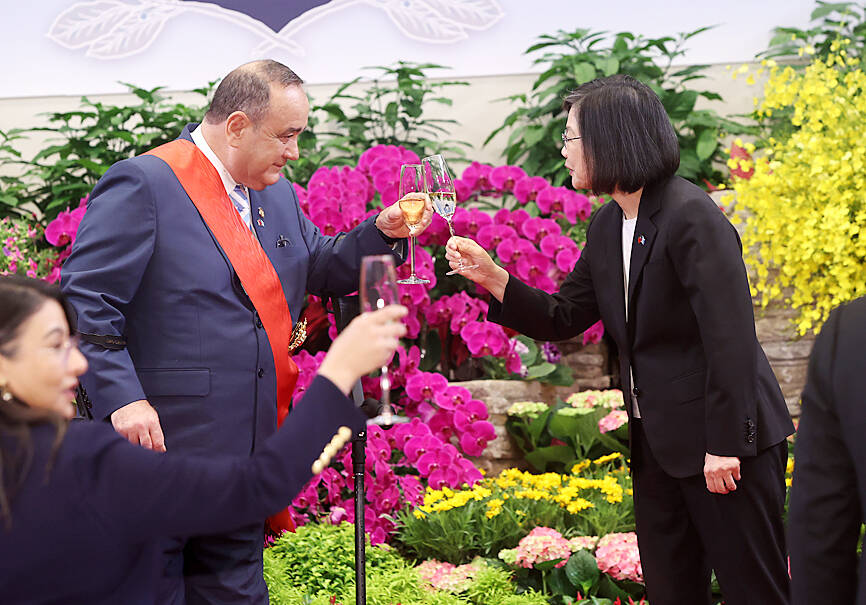The international community should support Taiwan in the face of threats from China, visiting Guatemalan President Alejandro Giammattei told the legislature in Taipei yesterday.
Giammattei, in a speech that made him the first head of state to address the legislature in 13 years, called on the international community and “the free world” to rally in support of Taiwan, which he said had long faced threats from across the Taiwan Strait.
Guatemala’s position has been to recognize and support the Republic of China (ROC) as an independent nation, Giammattei said.

Photo: CNA
He also underscored what he described as the importance of the international community respecting Taiwan’s sovereignty and territorial integrity.
The 67-year-old president added that his current visit at the head of an official delegation was a testament to Guatemala’s opposition to “foreign aggression.”
Giammattei’s visit to Taiwan comes just weeks after President Tsai Ing-wen (蔡英文) traveled to Guatemala as part of her 10-day overseas trip and one month after another Central American nation, Honduras, switched diplomatic recognition from Taipei to Beijing.

Photo: CNA
Giammattei said that while other nations had placed interests above friendship and changed allegiances, Guatemala, which established diplomatic relations with the ROC in 1933, remained committed to Taiwan.
Describing Taiwan as a longstanding strategic partner of Guatemala, Giammattei pledged to continue promoting the bilateral relationship between the two nations.
He also expressed gratitude for the Taiwanese government’s financial support for Guatemala over the years, including an estimated US$90 million in aid between 2013 and 2021, as well as scholarships given to young Guatemalans to study in Taiwan.
His speech, which was met with a standing ovation from lawmakers across party lines, was praised by Legislative Speaker You Si-kun (游錫?) as “significant” at a time when “the expansion of authoritarianism has shrunk the space for democracies” in the world.
You also conferred an honorary medal on Giammattei in recognition of his contributions to “the promotion of friendship and cooperation between Taiwan and Guatemala.”
Giammattei in the morning was welcomed by Tsai with a military salute at the Presidential Office Building.
The two held bilateral talks later in the afternoon, during which Tsai conferred upon Giammattei the Order of Brilliant Jade with Grand Cordon in recognition of his contributions to the friendship between the two nations.
Tsai said that Taiwan and Guatemala had weathered the COVID-19 pandemic together, and are continuing to deepen cooperation in areas including economic affairs, public healthcare and medicine, culture and education.
Giammattei said that the alliance between the two nations is founded on a shared belief in mutual respect and support, upholding national sovereignty and the pursuit of democracy.
The nations’ bilateral relationship is based on proactive, steady and long-term diplomatic engagement and broad cooperation, rather than “frivolous diplomatic language,” he said.
He concluded his remarks by saying: “Long live free, sovereign and democratic Taiwan.”
Giammattei arrived in Taiwan on Monday for a four-day visit that includes meetings with government officials, Guatemalan students and representatives from Taiwanese companies present in the Central American nation.
The delegation includes Guatemalan Congressional President Shirley Joanna Rivera Zaldana, Minister of Foreign Affairs Mario Adolfo Bucaro Flores and Minister of Economy Janio Moacyr Rosales Alegria.
Additional reporting by Kayleigh Madjar

SECURITY: As China is ‘reshaping’ Hong Kong’s population, Taiwan must raise the eligibility threshold for applications from Hong Kongers, Chiu Chui-cheng said When Hong Kong and Macau citizens apply for residency in Taiwan, it would be under a new category that includes a “national security observation period,” Mainland Affairs Council (MAC) Minister Chiu Chui-cheng (邱垂正) said yesterday. President William Lai (賴清德) on March 13 announced 17 strategies to counter China’s aggression toward Taiwan, including incorporating national security considerations into the review process for residency applications from Hong Kong and Macau citizens. The situation in Hong Kong is constantly changing, Chiu said to media yesterday on the sidelines of the Taipei Technology Run hosted by the Taipei Neihu Technology Park Development Association. With

CARROT AND STICK: While unrelenting in its military threats, China attracted nearly 40,000 Taiwanese to over 400 business events last year Nearly 40,000 Taiwanese last year joined industry events in China, such as conferences and trade fairs, supported by the Chinese government, a study showed yesterday, as Beijing ramps up a charm offensive toward Taipei alongside military pressure. China has long taken a carrot-and-stick approach to Taiwan, threatening it with the prospect of military action while reaching out to those it believes are amenable to Beijing’s point of view. Taiwanese security officials are wary of what they see as Beijing’s influence campaigns to sway public opinion after Taipei and Beijing gradually resumed travel links halted by the COVID-19 pandemic, but the scale of

A US Marine Corps regiment equipped with Naval Strike Missiles (NSM) is set to participate in the upcoming Balikatan 25 exercise in the Luzon Strait, marking the system’s first-ever deployment in the Philippines. US and Philippine officials have separately confirmed that the Navy Marine Expeditionary Ship Interdiction System (NMESIS) — the mobile launch platform for the Naval Strike Missile — would take part in the joint exercise. The missiles are being deployed to “a strategic first island chain chokepoint” in the waters between Taiwan proper and the Philippines, US-based Naval News reported. “The Luzon Strait and Bashi Channel represent a critical access

Pope Francis is be laid to rest on Saturday after lying in state for three days in St Peter’s Basilica, where the faithful are expected to flock to pay their respects to history’s first Latin American pontiff. The cardinals met yesterday in the Vatican’s synod hall to chart the next steps before a conclave begins to choose Francis’ successor, as condolences poured in from around the world. According to current norms, the conclave must begin between May 5 and 10. The cardinals set the funeral for Saturday at 10am in St Peter’s Square, to be celebrated by the dean of the College